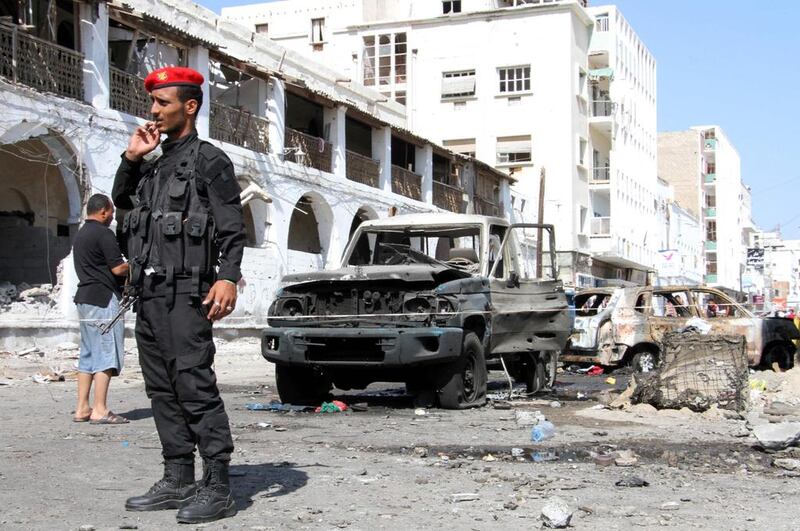Aden // Yemen’s president on Saturday rejected a UN peace proposal for his war-battered country saying it “rewards” the Houthi rebels.
The peace deal would give the Iran-backed insurgents — who seized the capital in 2014 — a share in the future government. It also reduces some of the president’s powers in exchange for a rebel withdrawal from major cities.
President Abdrabu Mansur Hadi rejected the deal after meeting the UN Envoy to Yemen Ismail Ould Cheikh Ahmed in Riyadh.
“The Yemeni people have condemned these ideas and the so-called road map out of belief that the deal is a gateway to more suffering and war,” Mr Hadi said. “The ideas presented ... carry the seeds of war,” he added. “It rewards the coup leaders and punishes the Yemeni people at the same time.”
Mr Hadi told Mr Ahmed that peace is only attainable when the rebel “coup” is reversed, based on a UN Security Council resolution that stipulates the rebels must lay down their weapons and withdraw from cities as a precondition to any peace agreement.
Full details of the peace plan, which was presented to the Houthis on Tuesday, have not been made public, but sources have said the proposal calls for agreement on naming a new vice president after the rebels withdraw from Sanaa and other cities and hand over heavy weapons to a third party.
Mr Hadi would then transfer power to the vice president who would appoint a new prime minister to form a government in which the north and south of Yemen would have equal representation.
In August, US Secretary of State John Kerry outlined a similar plan which offered the Houthi rebels participation in government in exchange for an end to violence and a surrender of weapons to a third party.
Arab Gulf states, most of which are members of a military coalition supporting Mr Hadi’s government, had “agreed unanimously” with that initiative, Mr Kerry said.
On Thursday, Dr Anwar Gargash, the UAE’s Minister of State for Foreign Affairs welcomed the UN plan. “The road map represents a political solution for the Yemeni crisis,” he said on Twitter.
But amid the diplomatic efforts to bring an end to the conflict, violence continued across the country on Saturday.
In Aden, security guards at the central bank prevented a suicide bomber from inflicting major damage when they opened fire on a car laden with explosives. The bomber to detonated the explosives far from the building, injuring four soldiers.
A police spokesman said the early morning attach caused slight damage to the bank, which the Yemeni government relocated from Sanaa to Aden in August after the Houthis rebels used most of the foreign currency reserves.
Aden was liberated from the Houthi rebels in July 2015 and became the temporary base for Mr Hadi’s government, but security forces have struggled to contain a series of bombings and assassinations carried out by extremist groups seeking to capitalise on the chaos from the civil war.
The situation in the city has improved slightly in recent weeks after several operations targeting militants linked to Al Qaeda and ISIL.
The conflict in Yemen has killed more than 7,000 people and displaced nearly 3 million.
The Saudi-led coalition, which joined the conflict in March 2015, has waged an air campaign in support of forces loyal to Mr Hadi.
At least 17 people were killed in Taiz province on Saturday by a coalition air strike that struck a house, local officials and residents said.
The raid targeted a house in the Al Salw district, the sources said, an area of Taiz where Houthi rebels and government forces are fighting for control. rnment forces.
The fighting between the two sides intensified in Al Salw in recent days and many families have fled their homes.
Meanwhile, Arab countries, including Morocco and Jordan, and religious organisations from across the region, added to the condemnation of a Houthi missile attack that landed 65km from Mecca on Thursday.
*With reporting from Mohammed Al Qalisi in Aden, Associated Press and Agence France-Presse





